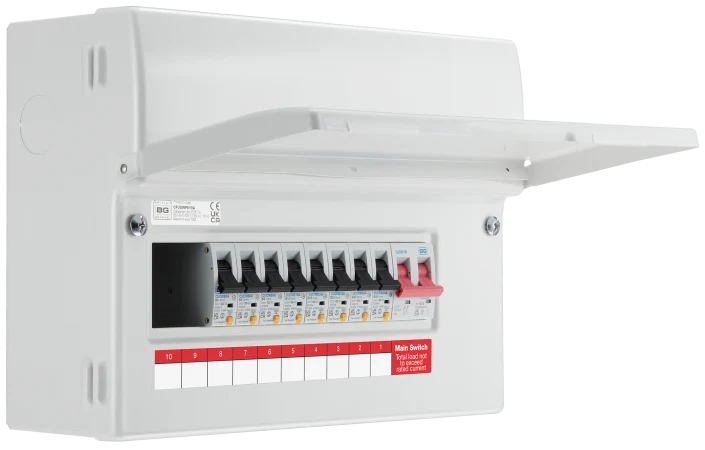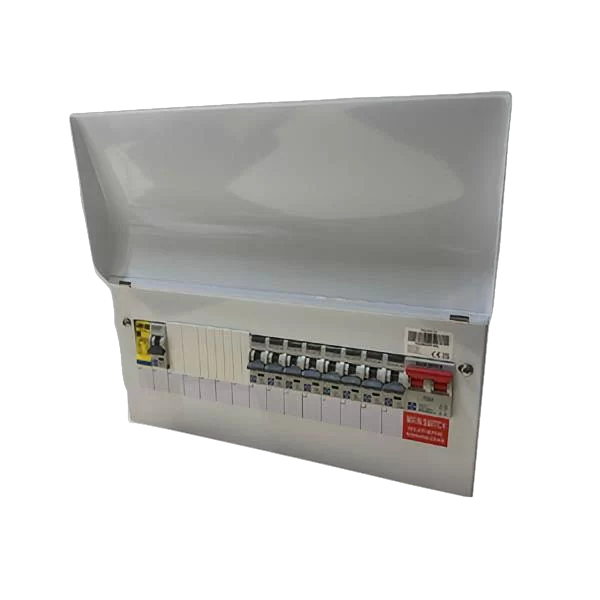A Comprehensive Overview to Maintaining Your RCBO CONSUMER UNITS Properly
A Comprehensive Overview to Maintaining Your RCBO CONSUMER UNITS Properly
Blog Article
The Function of Consumer Units in Effective Power Monitoring Systems
Consumer systems are indispensable to effective energy management systems, acting as the primary circulation points for electrical power within structures. By incorporating circuit breakers, they safeguard circuits from possible overloads, thus keeping security and preventing substantial interruptions. The advent of wise modern technologies has even more boosted their performance, enabling real-time information monitoring and nuanced power intake analysis. This assimilation not only enhances power usage however likewise helps with the incorporation of renewable power sources, consequently advertising lasting practices. Exactly how, after that, do these innovations convert to tangible benefits in day-to-day energy administration?
Comprehending Consumer Systems

Recognizing the duty of consumer devices starts with recognizing their crucial feature in protecting electrical systems. By isolating mistakes within certain circuits, consumer units protect against extensive outages and possible fire dangers. This seclusion is attained through the usage of circuit breakers that trip or integrates that blow when a fault is spotted, thereby removing the electrical flow to the impacted circuit.
Furthermore, customer devices help with the orderly distribution of power, enhancing the performance of energy use. They enable the methodical management of electric loads, which can be especially crucial in commercial and commercial setups where demand can change substantially. Correctly kept consumer devices add to the longevity of electrical systems and aid in minimizing downtime triggered by electric failings, ultimately supporting the smooth operation of energy-dependent centers.
Smart Technologies Combination

A key benefit of clever consumer devices is their capability to take advantage of advanced algorithms and artificial intelligence for anticipating analytics. This enables preemptive changes based on use patterns, climate forecasts, and other variables, substantially increasing overall effectiveness. Smart customer units facilitate demand reaction programs, where energy usage can be dynamically changed during height periods to maintain the grid and lower prices.
The assimilation of renewable resource resources, such as solar and wind, is also streamlined via wise consumer devices. By smartly handling the intermittency of these resources, these units make sure a trusted and well balanced energy supply. Furthermore, wise customer units boost customer involvement by providing detailed understandings and remote capabilities with mobile applications, promoting a more proactive technique to power preservation and sustainability.
Surveillance Energy Consumption
Building on the capacities of clever innovations assimilation, keeping an eye on energy intake ends up being a critical emphasis within energy administration systems. Reliable surveillance serves as the foundation for determining energy inefficiencies and executing corrective measures. By leveraging sophisticated metering framework (AMI), real-time information on power usage can be accumulated at granular degrees, supplying useful insights into intake patterns and peak demand durations. This data-centric technique enables both consumers and power managers to make educated decisions targeted at reducing waste and enhancing total efficiency.
Smart meters and Net of Points (IoT) tools play a critical function in this surveillance process. These devices can track power use in real-time, sending data to centralized systems for evaluation.
The integration of these innovations not just encourages customers with detailed information about their energy use but additionally supports energy providers in handling tons circulation much more successfully. Eventually, continual and accurate monitoring is indispensable for attaining power efficiency, cost savings, and sustainability goals within energy management systems.
Optimizing Device Usage

One effective approach includes recognizing top and off-peak hours to move energy-intensive tasks, such as laundry or dishwashing, to times when energy demand is reduced. This not just minimizes stress on the look here grid yet also takes advantage of reduced power tariffs. Furthermore, incorporating artificial intelligence formulas permits anticipating upkeep, making certain appliances run at optimal efficiency and extending their lifespan.
Energy management systems can additionally include user-specific preferences and actions to tailor home appliance use schedules. Smart lighting systems can readjust brightness based on tenancy and all-natural light accessibility, while A/c systems can keep convenience degrees without extreme energy usage.
Supporting Sustainability
Promoting sustainability within energy management systems entails not just improving effectiveness but likewise cultivating environmentally responsible methods. Consumer systems are integral to this procedure, as they provide real-time information and control systems that make it possible for individuals to check and decrease their energy intake. By leveraging innovative technologies, customer devices can recognize energy-saving possibilities and facilitate the integration of eco-friendly power resources like solar and wind power.
One important element of advertising sustainability is informing consumers on the advantages of responsible power use. With thorough insights offered by consumer units, customers can make educated decisions that lessen address their carbon footprint. For instance, these systems can suggest optimal times for running high-energy devices based upon grid need and sustainable energy schedule, consequently minimizing dependence on nonrenewable fuel sources.
Furthermore, customer systems support the adoption of smart grid innovations, which boost the overall efficiency and reliability of power circulation. By enabling two-way communication in between consumers and energy carriers, these systems can dynamically get used to energy needs, minimizing waste and advertising making use of sustainable energy practices.
Conclusion
Consumer systems, as indispensable parts of energy administration systems, considerably improve electrical security and efficiency within buildings with circuit protection and clever innovation combination. Additionally, the incorporation of eco-friendly energy sources promotes lasting practices, adding to reduced overall power usage and reduced carbon footprints.
Advancements in smart innovations have reinvented the abilities of power management systems, particularly through the combination of smart consumer devices.Structure on the abilities of smart technologies integration, keeping an eye on energy usage comes to be a crucial emphasis within energy monitoring systems.Efficient home appliance usage optimization is an essential element of power management systems, aiming to enhance effectiveness and minimize unnecessary energy consumption.Customer devices, as important components of energy monitoring systems, considerably Continued boost electric security and efficiency within buildings via circuit security and clever innovation combination. In addition, the consolidation of sustainable power resources promotes sustainable practices, contributing to decreased total power intake and reduced carbon impacts.
Report this page